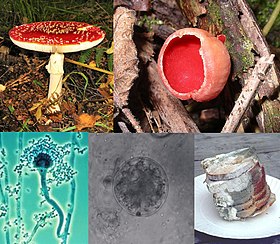ਉੱਲੀ
ਦਿੱਖ
| ਉੱਲੀ Fungi | |
|---|---|

| |
| ਸਿਖਰ ਖੱਬਿਓਂ ਘੜੀ ਦੇ ਰੁਖ਼ ਨਾਲ਼: ਐਮਾਨੀਟਾ ਮੁਸਕਾਰੀਆ, ਇੱਕ ਬੈਸੀਡੀਉਮਾਈਸੀਟ; ਸਾਰਕੋਸਾਈਫ਼ਾ ਕੋਕੀਨੀਆ, ਇੱਕ ਐਸਕੋਮਾਈਸੀਟ; ਉੱਲੀ ਲੱਗੀ ਬਰੈੱਡ; a ਕਾਈਟਰਿਡ; ਇੱਕ ਐਸਪਰਜੀਲਸ ਕੌਨੀਡੀਓਫ਼ੋਰ। | |
| Scientific classification | |
| Domain: | |
| (unranked): | |
| Kingdom: | ਉੱਲੀ |
| Subkingdoms/Phyla/Subphyla[2] | |
|
Dikarya (inc. Deuteromycota) Subphyla incertae sedis | |
ਉੱਲੀ ਸੁਕੇਂਦਰੀ ਜੀਵਾਂ ਦੀ ਇੱਕ ਵੱਡੀ ਸਮੂਹ ਵਿਚਲੇ ਉਹ ਜੀਅ ਹਨ, ਜਿਹਨਾਂ ਵਿੱਚ ਖ਼ਮੀਰ ਅਤੇ ਮੋਲਡ ਵਰਗੇ ਸੂਖਮ ਜੀਵ ਅਤੇ ਖੁੰਭਾਂ ਆਦਿ ਸ਼ਾਮਲ ਹਨ। ਜੈਵਿਕ ਵਰਗੀਕਰਨ ਮੁਤਾਬਕ ਇਹਨਾਂ ਨੂੰ ਉੱਲੀ (Lua error in package.lua at line 80: module 'Module:Lang/data/iana scripts' not found.) ਨਾਂ ਦੇ ਇੱਕ ਵਰਗ ਵਿੱਚ ਰੱਖਿਆ ਗਿਆ ਹੈ ਜੋ ਬੂਟਿਆਂ, ਜਾਨਵਰਾਂ, ਬੈਕਟੀਰੀਆ ਆਦਿਕ ਤੋਂ ਵੱਖ ਹਨ। ਇੱਕ ਮੁੱਖ ਫ਼ਰਕ ਇਹ ਹੈ ਕਿ ਉੱਲੀ ਦੇ ਕੋਸ਼ਾਣੂਆਂ ਦੁਆਲੇ ਇੱਕ ਕੰਧ ਹੁੰਦੀ ਹੈ ਜਿਸ ਵਿੱਚ ਕਾਈਟਿਨ ਨਾਮਕ ਪਦਾਰਥ ਹੁੰਦਾ ਹੈ ਜਦਕਿ ਪੌਦਿਆਂ ਆਦਿ ਦੇ ਕੋਸ਼ਾਣੂਆਂ ਦੀਆਂ ਕੰਧਾਂ ਵਿੱਚ ਸੈਲੂਲੋਜ਼ ਹੁੰਦਾ ਹੈ। ਜੀਵਾਣੂਆਂ ਦੀ ਘੋਖ ਤੋਂ ਪਤਾ ਲੱਗਿਆ ਹੈ ਕਿ ਉੱਲੀ ਦਾ ਰਿਸ਼ਤਾ ਬੂਟਿਆਂ ਦੀ ਬਜਾਏ ਜਾਨਵਰਾਂ ਨਾਲ਼ ਵਧੇਰੇ ਨੇੜ ਦਾ ਹੈ।
ਵਿਕੀਮੀਡੀਆ ਕਾਮਨਜ਼ ਉੱਤੇ ਉੱਲੀ ਨਾਲ ਸਬੰਧਤ ਮੀਡੀਆ ਹੈ।
